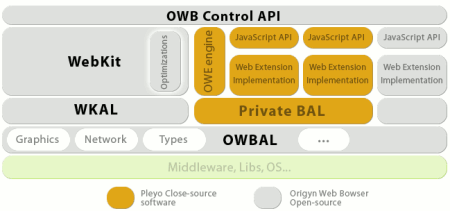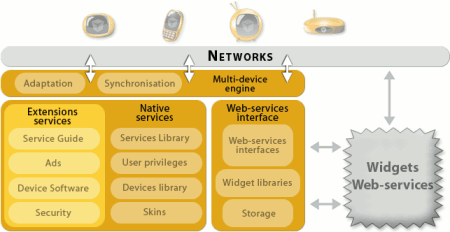Open source webkit-based browser rev’d
Jul 17, 2008 — by Eric Brown — from the LinuxDevices Archive — 9 viewsPleyo and Sand-Labs.org have released a third-generation beta version of their Webkit-based, open source browser for consumer-electronics devices. Supporting generic GTK, Access Linux Platform, or SDL (simple direct layer), Origyn Web Browser (OWB) targets consumer devices such as phones, portable media players, and set-top boxes.
Montpellier, France-based Pleyo offers development and consulting services around OWB, together with Sand-Labs.org, which releases the lightweight browser under a BSD license. Introduced a year ago, OWB was the first open source browser based on Webkit, the open source HTML rendering engine that powers Apple's Safari browser for desktops and devices, as well as Nokia's browser for its Symbian-based S60 platform.
In addition to the Webkit rendering engine, the OWB browser includes an abstraction layer (OwBaL) aimed at simplifying ports to new software environments, and reducing footprint by enabling the use of existing system libraries. Touted new features in the v3 release include:
- Day-to-day merge capability with Apple Webkit
- Full NPAPI (Netscape Plugin API) support
- Fully documented high-level API
- Fully automated tested abstraction layer
OWB v3 can be built with glibc or uClibc, for x86, ARM, and SH processors, says Pleyo. The v3 browser also supports Mac OS X, and for the first time, the AmigaOS. The Linux versions are offered in a minimalist sample SDL release, a full GTK implementation (based on WebKit community work), and a sample implementation from Pleyo targeting the ALP mobile phone stack from Access.

Pleyo Origyn Web Extensions architecture
(Click to enlarge)
In addition, Pleyo offers commercial, closed-source extensions to OWB v3. Origyn Web Extensions is a mechanism to expose middleware facilities in Javascript or to introduce new features into the browser, says the company. The Origyn Suite, meanwhile, is a library of services, widgets, and applications (see diagrams above and below).

Pleyo Origyn Suite
(Click to enlarge)
According to Pleyo CTO Jean-Charles Verdié, in an email, the Webkit merge capability was a leading request from OWB users. “Pleyo developed a complex product named 'BALifier,' which transforms WebKit sources into OWB sources with barely any human interaction.”
Verdié, who wrote a white paper on OWB when it was launched, also offered these insights into the general nature of OWB. “OWB's added value stands in a full refactoring of the low layers of Webkit, switching from a monolithic platform approach to a modular, library-grained abstraction layer. This approach avoids any browser-to-system dependency (everything being hidden below the OWBAL), and saves resources since instead of using ad hoc or generic code, it entices [developers] to use [the] native optimized library.”
Webkit is an open source HTML rendering engine best known for its use in Apple software, including the iPhone, the Safari browser, Dashboard, Mail, and other Mac OS X applications. Nokia, meanwhile, has used Webkit in its flagship Symbian S60 smartphones since 2005, and Adobe uses it as the basis for its AIR (Adobe Integrated Runtime) web development suite. Most recently, Trolltech (now part of Nokia) integrated it into its Qt 4.4 cross-platform development framework.
Webkit derived from the KHTML rendering engine used in the KDE project's Konqueror browser, but today offers more advanced support for “Web 2.0” features, including asynchronous Javascript (AJAX). Webkit has a reputation for having a smaller footprint than Gecko, the rendering engine used in Firefox and many GNOME applications. However, the Firefox project is working on a leaner, faster device browser codenamed Fennec.
Availability
OWB v3 is available now in beta form under the release code name “DoDuo,” with a public release due in September. Free downloads are available here. For more background, including nice screenshots of OWB running on Nokia's N800/N810 and OpenMoko's Neo1973, don't miss Verdie's whitepaper Introducing OWB, an open-source browser for consumer devices.
This article was originally published on LinuxDevices.com and has been donated to the open source community by QuinStreet Inc. Please visit LinuxToday.com for up-to-date news and articles about Linux and open source.